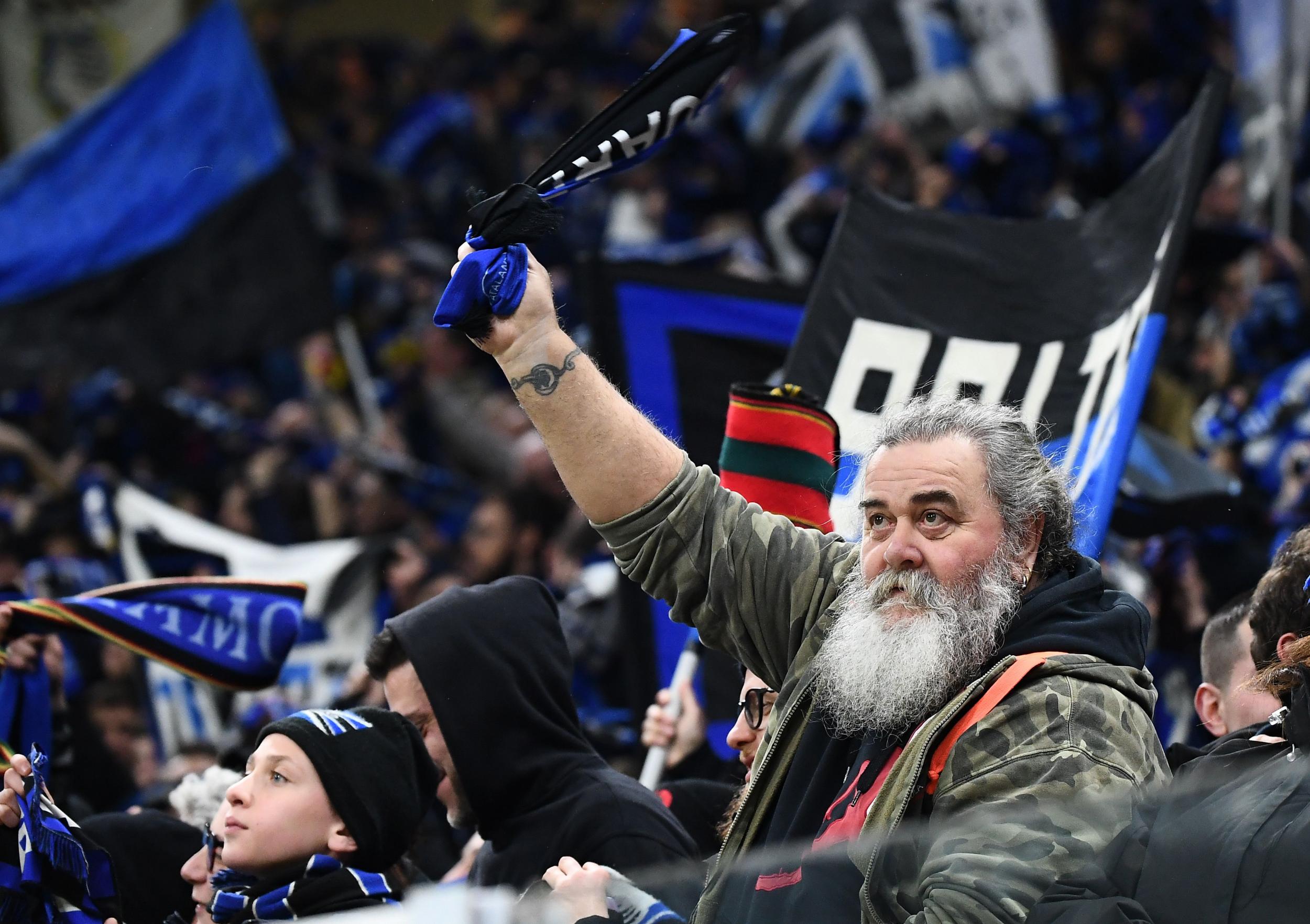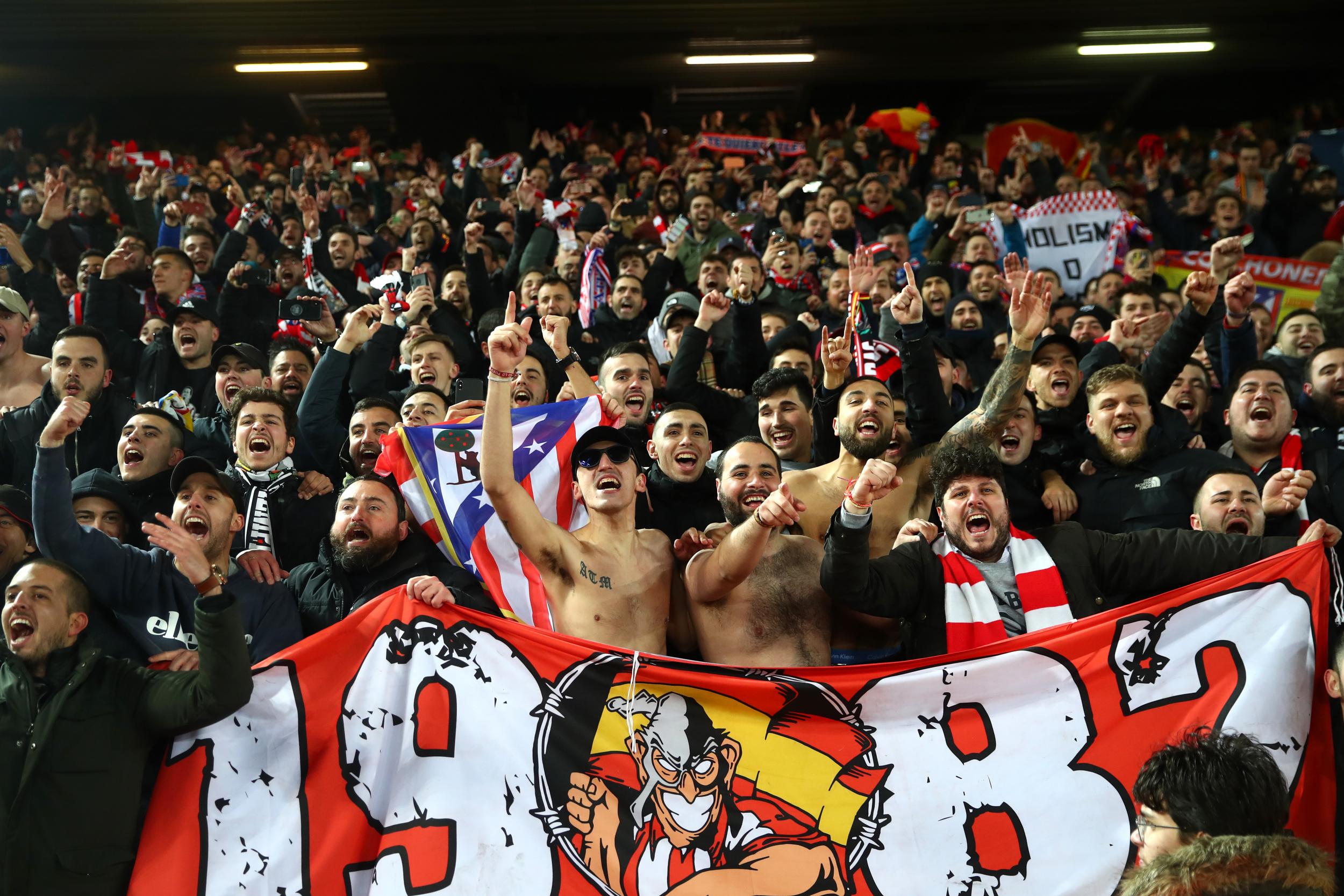‘A biological bomb’: The story of the Champions League game which sparked Italy’s coronavirus crisis
The public health disaster that was Atalanta’s last-16 first leg against Valencia could not have been avoided, according to those who were there, but did we learn from its lessons?

Your support helps us to tell the story
From reproductive rights to climate change to Big Tech, The Independent is on the ground when the story is developing. Whether it's investigating the financials of Elon Musk's pro-Trump PAC or producing our latest documentary, 'The A Word', which shines a light on the American women fighting for reproductive rights, we know how important it is to parse out the facts from the messaging.
At such a critical moment in US history, we need reporters on the ground. Your donation allows us to keep sending journalists to speak to both sides of the story.
The Independent is trusted by Americans across the entire political spectrum. And unlike many other quality news outlets, we choose not to lock Americans out of our reporting and analysis with paywalls. We believe quality journalism should be available to everyone, paid for by those who can afford it.
Your support makes all the difference.Kike Mateu covers Valencia. Keen followers of Spanish football may recognise him as one of the contributors to El Chiringuito de Jugones, a lively late night debate show which discusses La Liga’s latest gossip and talking points. But over the last couple of months, Mateu has become known for another reason. “Yes it’s true,” he says. “In Valencia, I’m the so-called ‘patient zero’.”
Back in February, Mateu travelled to Milan to report on Valencia’s trip to play Atalanta, who themselves are the underdog story of the Champions League season. The first leg of their last-16 tie was held at the San Siro, 35 miles away from Atalanta’s hometown of Bergamo. Approximately 40,000 Bergamaschi were in attendance to witness at first hand the biggest game in their club’s history, with the majority of them making the short trip across Lombardy to the region’s capital.
Atalanta won 4-1 that night, establishing a first-leg lead that would ultimately see them progress to the quarter-finals. And it should be no surprise to learn that each of their four goals was celebrated with little concern for social distancing. Hugging, kissing, wild embraces: what else would you expect after waiting 112 years for a victory of such a great scale on such a grand stage?
Meanwhile, after the final whistle, Mateu was among 70-odd reporters ducking, diving and pressing up against each other in the San Siro’s notoriously cramped mixed zone. He conducted his interviews, filed his reports and returned to Valencia. Then a few days later, he picked up a cold. “A little fever, generally unwell, a cough and a little shortness of breath,” he says. He was concerned enough by his symptoms to visit a university hospital in Valencia. It was there that he tested positive for coronavirus.
The mayor of Bergamo last week described the Atalanta-Valencia match which Mateu and thousands of others attended as “a biological bomb”. It was very probable, Giorgio Gori claimed, that the 40,000 Atalanta supporters in the stands had passed the virus between each other while falling on top of each other in celebration of their team’s victory and then brought it back en masse to Bergamo. “Unfortunately, we couldn’t have known,” he said. “No one knew the virus was already here. It was inevitable.”
It is not currently possible to say how many cases are directly linked to the Atalanta-Valencia match, but what is certain is that Bergamo subsequently became the epicentre of the crisis in northern Italy. The city’s total number of dead is still rising, more than six weeks later. A recent study suggests it could be more than double the official tally of 2,060, as many die at home and go unregistered by the hospitals.
In the weeks that followed the first leg on 19 February, Valencia announced more than a third of their players and staff had since tested positive for coronavirus. There is only one confirmed case among Atalanta’s squad – Marco Sportiello, the second-choice goalkeeper – but club president Antonio Percassi has said that at least eight club employees had contracted the virus. Meanwhile, those who were in the stands that night have been left to wonder whether they inadvertently put themselves at the centre of a public health disaster.
Daniel Lister has been an Atalanta supporter since hearing of their defeat to Merthyr Tydfil in the 1987 Cup Winners’ Cup on the nine o’clock news. His family booked a trip to Milan during the February half-term break, which happily coincided with the Valencia first leg. Their temperatures were checked as they disembarked the plane at Milan Malpensa. As far as precautionary measures went, that was it. They had arrived in a city wary of the coronavirus but hardly treating it as an imminent threat.
“In terms of wandering around Milan and sight-seeing, it was bustling,” says Lister. “I was in equally close proximity with people sight-seeing on the day of the match and in the run-up to it as I was at the match itself. There was not a great deal of people wearing masks. We were staying in an apartment complex and there was a big supermarket over the road that was absolutely packed. We ate out a couple of nights. It was a bit like ourselves in the UK really, if you rewind four weeks.”
Conor Clancy, an Irish journalist based in Parma, was covering the game for ForzaItalianFootball. “I remember being on a packed train going across Milan on the metro and meeting up with my friends,” he says. Clancy was not too worried. There was no reason to be – even in Lombardy, social distancing was simply not a thing six weeks ago – and he brushed off concerned texts from his mum. “A typically Irish mother, messaging me like: ‘Make sure you’re safe’. What are you talking about, it’s a flu?!”
Clancy happens to be an Atalanta supporter. He quietly clenched a fist underneath the table as Gian Piero Gasperini’s side established their commanding lead, but press box etiquette is a little looser in Italy than at home, and others were more expressive. “You’d look to the right and the left and they were just people going absolutely nuts,” he remembers, “leaning into the press area, high-fiving their mates. The scenes of hugging and kissing in groups of fours and fives was very much on the money.”

Paul Lowe backs that up. “Let’s just say the Atalanta fans went crazy, as they do.” He began supporting Atalanta after befriending fans in a Bergamo bar a decade ago and regularly travels out to watch their games. On this occasion, he and his brother were standing among the main throng of Atalanta supporters behind one of the goals. As limbs flew in celebration of Atalanta’s third, scored by Remo Freuler, he stumbled and fell over. “I ended up on the floor with about 10 Atalanta fans on top of me.”
Not that it worried him at the time. “At no point walking in that ground, standing next to fans and mixing as you do at football games was there a real concern or was anybody purposely moving away from any other person,” he adds. And even afterwards, as thousands left the San Siro for Bergamo or dispersed into Milan’s bars, the virus was still far from anyone’s thoughts. “People were joking, talking about people not buying Corona beer,” says Clancy, “but nobody was actually talking about the coronavirus being a threat.”
That quickly changed. The following day brought Italy’s first case of coronavirus in a patient who had not travelled to China. By Saturday, the country had the most cases of any outside Asia. “That’s when things started to get dark,” says Clancy, who walked through an empty Bologna Centrale while travelling back from Spal-Juventus that night to find a departures board filled by cancellations. By the end of the weekend, there were 114 cases in Lombardy alone. On Monday, an 84-year-old man with pre-existing medical conditions became Bergamo’s first fatality.
Naturally, those who had attended the San Siro were following the news. Lowe was instructed by his employers to self-isolate at home for seven days. His brother, who he had travelled with to the San Siro, developed symptoms that were fortunately judged to be nothing more than a common cold. Lister’s two-year-old daughter did not attend the match but, a week or so after their return, she was sent home from nursery with a runny nose and tested for coronavirus at a local hospital. Thankfully, the results were negative.

The obvious question is whether this was in any way preventable. Aleksandar Ceferin, the Uefa president, believes not. Every person in attendance at the San Siro contacted by The Independent for this article agrees. “There’s nobody in the world at that point in time, on that day or the days before that would have said cancel that game,” says Lowe. Lister concurs. “I think it’s one of those ones where hindsight is fantastic. For it to have been called off, it would have been impossible, like prediction of the future. Nobody would have had a clue.”
And yet at the same time, all of them questioned why lessons were not learned from what happened at the San Siro. Clancy is stunned that, three weeks later, a sold-out Anfield welcomed 3,000 travelling fans for Liverpool’s last-16 second leg against Atletico Madrid. “I genuinely could not understand the thinking behind it,” he says. “There was a round of Serie A that was half played and then a round the next weekend behind closed doors, meanwhile 50,000 people were going to a game in England where people from Spain – which is as badly affected as Italy – were allowed to travel.”
Mateu shares that disbelief that the Anfield game went ahead with crowds, but was equally shocked by the decision to hold the second leg of Atalanta and Valencia’s tie, even though it came behind closed doors. “That game should never have been played,” he says. “At that time, Uefa already knew of the severity and spread of the virus precisely in northern Italy. Bergamo was clearly a risk area and in Spain the virus had already arrived in a serious way. Uefa put its own interests first, above those of health. The competition before people.”
Mateu knows the risk the virus poses, having spent 25 days in isolation in hospital after testing positive. His symptoms were mild enough for him to use his social media channels as a diary, informing his thousands of followers about how the disease progresses and how it is treated. All the while, though, he waited for the second negative test that would mean a clean bill of health and returning to his family. When it came, he cried. “As you can imagine, when I was told that I had tested negative and was leaving for home was one of the most exciting moments of my life,” he says. It is a life he does not take for granted.
Join our commenting forum
Join thought-provoking conversations, follow other Independent readers and see their replies
Comments